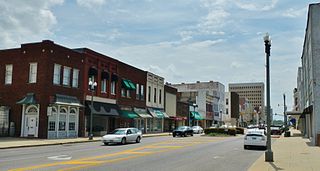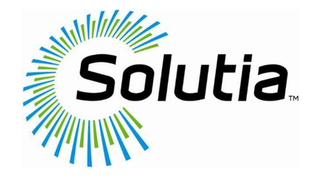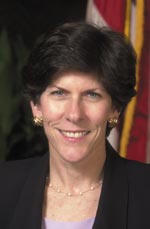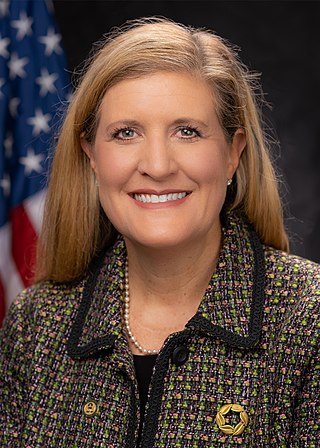David Baker | |
|---|---|
 | |
| Nationality | American |
| Occupation | Activist |
David A. Baker is an American activist. A former union organizer, Baker is the founder and director of Community Against Pollution.
David Baker | |
|---|---|
 | |
| Nationality | American |
| Occupation | Activist |
David A. Baker is an American activist. A former union organizer, Baker is the founder and director of Community Against Pollution.
Baker is from Anniston, Alabama. [1] As children, he and his younger brother Terry would play in ditches and cross the water in the ditches that were used for the Monsanto plant run-off.[ citation needed ]
In 1970 [2] his brother died of brain and lung cancer at the age of 17. Baker believes that this was caused by PCBs in the environment. [3] Since then he has been instrumental in getting lawyers to represent the people who appear to be the victims of PCB poisoning. [4]
In 1995 while he was working for an environmental company, he accidentally discovered that the presence of PCB's had been covered up for 50 years. [5]
He is the founder and Executive Director of the organization Community Against Pollution. [6] [7]
He was also active in the organisation of a team of workers going to help in the clean-up of the Gulf of Mexico oil spill. [8]

Polychlorinated biphenyls (PCBs) are highly carcinogenic chemical compounds, formerly used in industrial and consumer products, whose production was banned in the United States by the Toxic Substances Control Act in 1976 and internationally by the Stockholm Convention on Persistent Organic Pollutants in 2001.

The Environmental Protection Agency (EPA) is an independent agency of the United States government tasked with environmental protection matters. President Richard Nixon proposed the establishment of EPA on July 9, 1970; it began operation on December 2, 1970, after Nixon signed an executive order. The order establishing the EPA was ratified by committee hearings in the House and Senate.
The Monsanto Company was an American agrochemical and agricultural biotechnology corporation founded in 1901 and headquartered in Creve Coeur, Missouri. Monsanto's best-known product is Roundup, a glyphosate-based herbicide, developed in the 1970s. Later, the company became a major producer of genetically engineered crops. In 2018, the company ranked 199th on the Fortune 500 of the largest United States corporations by revenue.

Anniston is the county seat of Calhoun County in Alabama, United States, and is one of two urban centers/principal cities of and included in the Anniston-Oxford Metropolitan Statistical Area. As of the 2010 census, the population of the city was 23,106. According to 2019 Census estimates, the city had a population of 21,287. Named "The Model City" by Atlanta newspaperman Henry W. Grady for its careful planning in the late 19th century, the city is situated on the slope of Blue Mountain.

Toxic waste is any unwanted material in all forms that can cause harm. Mostly generated by industry, consumer products like televisions, computers, and phones contain toxic chemicals that can pollute the air and contaminate soil and water. Disposing of such waste is a major public health issue.

Solutia Inc. was an American manufacturer of materials and specialty chemicals including polyvinyl butyral (PVB), ethylene vinyl acetate (EVA), and thermoplastic polyurethane (TPU) interlayers for laminated glass, aftermarket window films, protective barrier and conductive films, and rubber processing chemicals. The company was formed on September 1, 1997, as a divestiture of the Monsanto Company chemical business. In July 2012, the company was acquired by Eastman Chemical Company.
Halocarbon compounds are chemicals in which one or more carbon atoms are linked by covalent bonds with one or more halogen atoms resulting in the formation of organofluorine compounds, organochlorine compounds, organobromine compounds, and organoiodine compounds. Chlorine halocarbons are the most common and are called organochlorides.
The Hudson River Sloop Clearwater, Inc. is a non-profit organization based in Beacon, New York that seeks to protect the Hudson River and surrounding wetlands and waterways through advocacy and public education. Founded by folk singer Pete Seeger with his wife Toshi Seeger in 1966, the organization is known for its sailing vessel, the sloop Clearwater, and for its annual music and environmental festival, the Great Hudson River Revival.
Ted Smith is the founder and former executive director of the Silicon Valley Toxics Coalition, co-founder of the International Campaign for Responsible Technology, and chair of the Electronics TakeBack Coalition steering committee.

Linda Jane Fisher was a Vice President Safety, Health and Environment and Chief Sustainability Officer of DuPont.

Benjamin Franklin Chavis Jr. is an African-American activist, author, journalist, and the current president and CEO of the National Newspaper Publishers Association. He serves as national co-chair for the political organization No Labels.
Robina Suwol is an American business executive, the founder and executive director of California Safe Schools a children's environmental health and justice coalition founded in 1998.
The World According to Monsanto is a 2008 film directed by Marie-Monique Robin. Originally released in French as Le monde selon Monsanto, the film is based on Robin's three-year-long investigation into the corporate practices around the world of the United States multinational corporation, Monsanto. The World According to Monsanto is also the title of a book written by Robin.
Community Against Pollution aka Citizens Against Pollution or (CAP) is an organization formed by the residents of Anniston, Alabama, in response to the effects of pollution.
Brofiscin Quarry, Groes Faen is a disused limestone quarry in Groes-faen, near Llantrisant in South Wales. It was used for about seven years for the dumping of toxic waste including polychlorinated biphenyls (PCBs) and was capped in 2011. Some 72 000m3 / 80 000 tonnes of material was dumped here. Prior to its remediation, The Guardian described the site as "one of the most contaminated places in Britain." The level of pollution is such that it featured in an international conference discussing remediation of contaminated land. These events were described by The Ecologist magazine as "one of the biggest environmental crimes to have occurred in the UK". and the key witness at an Environmental Agency inquiry on 2006 ended up needing to live under police protection. The company using this disposal site also used the nearby Maendy Quarry.
Industrial Bio-Test Laboratories was an American industrial product safety testing laboratory. IBT conducted significant quantities of research for pharmaceutical companies, chemical manufacturers and other industrial clients; at its height during the 1950s, 1960s, and 1970s, IBT operated the largest facility of its kind and performed more than one-third of all toxicology testing in the United States. IBT was later confirmed of engaging in extensive scientific misconduct and fraud, which resulted in the indictment of its president and several top executives in 1981 and convictions in 1983. The revelations of misconduct by IBT Labs led to reforms in the regulation of pesticides in the United States and Canada.

Alexandra Dapolito Dunn is an American environmental lawyer and law professor, specializing in chemical and pesticide regulation, water quality issues, water treatment issues, urban development, rule of law, environmental justice, environmental conflict resolution, cooperative federalism, and implementation of the Clean Water Act and the Frank R. Lautenberg Chemical Safety for the 21st Century Act. Dunn was an executive at several environmental management associations, and served as Regional Administrator for New England in the US Environmental Protection Agency (EPA), and Assistant Administrator for EPA's Office of Chemical Safety and Pollution Prevention.

Between 1947 and 1977, General Electric polluted the Hudson River by discharging polychlorinated biphenyls (PCBs) causing a range of harmful effects to wildlife and people who eat fish from the river. Other kinds of pollution, including mercury contamination and cities discharging untreated sewage, have also caused problems in the river.
Monsanto was involved in several high-profile lawsuits, as both plaintiff and defendant. It had been defendant in a number of lawsuits over health and environmental issues related to its products. Monsanto also made frequent use of the courts to defend its patents, particularly in the area of agricultural biotechnology. Bayer acquired Monsanto in 2018, and the company has since been involved in litigation related to ex-Monsanto products such as glyphosate, PCBs and dicamba. In 2020 it paid over $10 billion to settle lawsuits involving the glyphosate based herbicide Roundup.
Environmental racism is a form of institutional racism, in which people of colour bear a disproportionate burden of environmental harms, such as pollution from hazardous waste disposal and the effects of natural disasters. Environmental racism exposes Native Americans, African Americans, Asian Americans, Pacific Islanders, and Hispanic populations to physical health hazards and may negatively impact mental health. It creates disparities in many different spheres of life, such as transportation, housing, and economic opportunity.